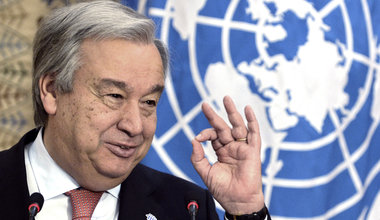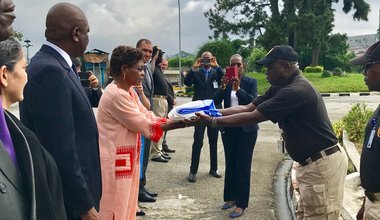Daily Brief on Cote d’Ivoire for Wednesday, 5 November 2008
Highlights
- SRSG meets with RDR president Alassane Dramane Ouattara
- UNOCI launches 1000 taxis pilot project for identification
- Insecurity in west is cause for concern for UNOCI and local authorities
Political
The Special Representative of the UN Secretary-General for Cote d'Ivoire, Y.J. Choi today met with the President of the Rally for Republicans party, Alassane Dramane Ouattara. Speaking after the encounter, Mr. Choi said that he briefed Mr. Ouattara on the UN Security Council meeting held in New York last week. The two leaders also discussed the next meeting of the Permanent Consultative Framework, which is due to be hosted in Ouagadougou, Burkina Faso, by President Blaise Compaore.
Electoral process
In connection with UNOCI's support for the identification and voter registration operation, SRSG Choi yesterday announced that the Mission was going to launch a pilot project with 1000 taxis to transport electoral agents and equipment in Abidjan and Bouaké. The project could spread to other parts of the country if it proves effective. At the launch yesterday at the Ivorian Prime Minister's office, Mr. Choi said the 1000 taxis were in addition to the 34 vehicles that the Mission handed over to the Independent Electoral Commission yesterday. Meanwhile, according to media reports, identification and voter registration centres continue to be targeted for attacks. On the night of 3 November 2008, four computer screens, a CPU, a keyboard, three identification kits and two cartons of identification forms were stolen from a centre in the Abidjan neighbourhood of Abobo.
Security
Following a marked increase in banditry in the Moyen Cavally region in western Cote d'Ivoire, the Prefect of Guiglo on 3 November 2008, met with local traditional chiefs and strongly urged them not to allow roadside bandits to operate in their communities and to denounce them to security forces. Meanwhile on the same day, roadside bandits attacked a bus travelling between Zangue and Guiglo (west). The assailants, armed with AK 47 rifles, forced the driver to stop before robbing the passengers of their money and valuables. The local police have opened an investigation.
Arms Embargo
UNOCI peacekeepers yesterday carried out arms embargo inspections at the Armed Forces of the Forces Nouvelles' (FAFN) Zone-4 unit in Sarala (north-west), at its 82nd Battalion in Odienné (north), its 11th battalion in Dabako, near Bouna (north), at the National Armed Forces of Côte d'Ivoire's (FANCI) Gendarmerie Company in Guiglo (west), at its Gendarmerie Brigade in Ouele, near Daoukro (east) and its Naval Base annex in the Abidjan district of Plateau.
Road accident
A UNPOL team was last night involved in a road traffic accident with a motorcycle, while patrolling in the centre of Bouaké with PAKBATT and BANFPU. Two civilians riding on the motorcycle were injured and evacuated to Ghanmed hospital for treatment, but one of them died during the night. UNOCI's Security section investigating the accident.
Human Rights
The Regional Human Rights Office in Bouaké is following up the case of a 21 year-old woman who was shot and killed in front of her house in the Air France III neighbourhood of Bouaké on 1 November 2008. She was allegedly killed by a demobilized FAFN soldier who reportedly made death threats against her on several occasions and used to physically assault her after she ended their relationship.
On 30 October 2008, the Regional Human Rights Office and Child Protection Section in Bondoukou conducted a training session for 85 FAFN soldiers in Bouna (north) on human rights norms and principles with special emphasis on child rights.
The Regional Human Rights Office in Odienné (north west) in collaboration with the African Union Club organized human rights training for 19 representatives of women organizations from Odienné, Tomba, Bako and Nienesso, Tienko and Tiemé, 30 km east of Odienné from 3 to 4 November 2008. The training covered the role of women in decision-making, human rights and elections as well as financial and administrative management of NGOs. As a result of the training the participants resolved to create a women's human rights network to monitor violations of women rights in the Denguélé region. They also resolved to support the education of young girls and to fight against female genital mutilation.
 ONU
ONU Nations Unies Maintien de la paix
Nations Unies Maintien de la paix




